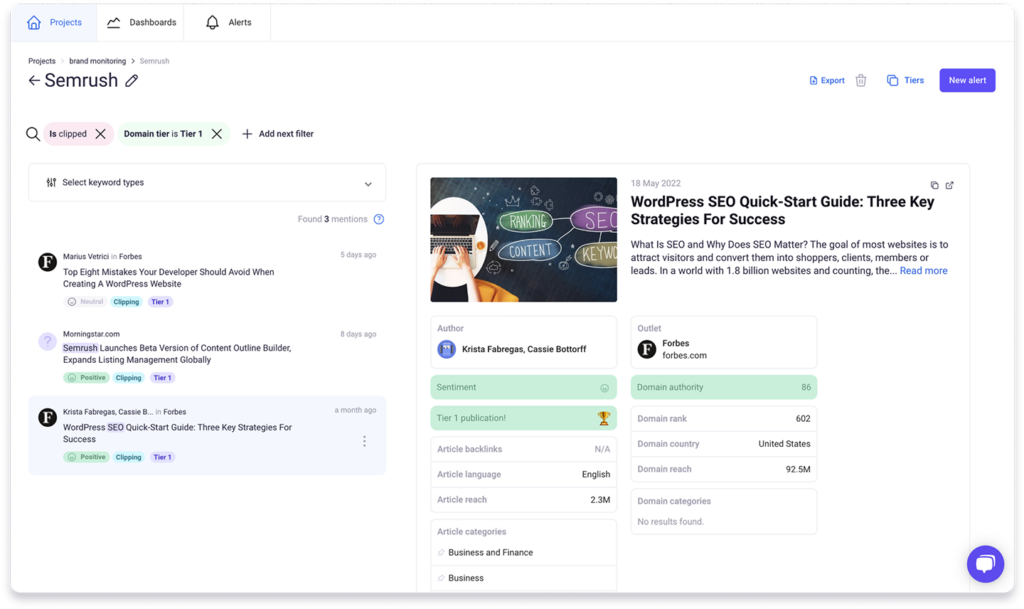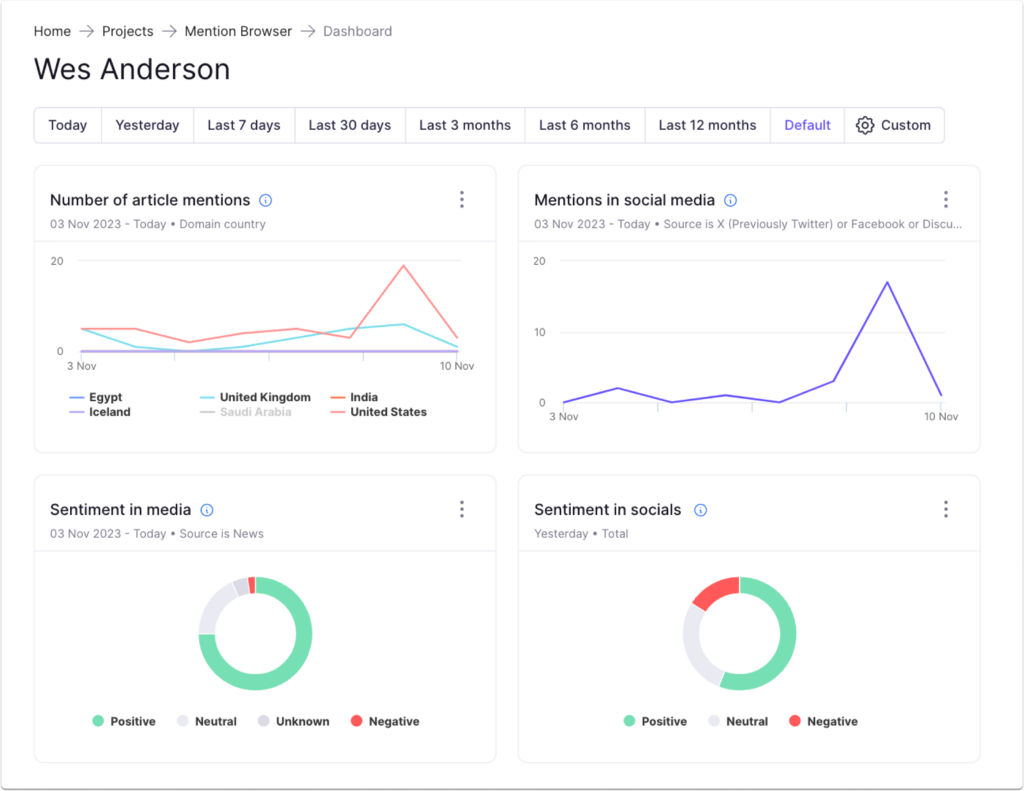What is being said about your company and why should you care?
Corporate reputation impacts all business aspects: from who buys your products through partnerships, stock market results, and even job candidates. All of which translates into your financial results.
And the good news is, it can be managed. It's called effective corporate reputation management. It consists on several strategies and techniques that you can adjust to your company needs — and this article is here to help you out.
Imagine having a tool that simplifies your media relations and crisis communication, ensuring your brand’s story is always on point. Ready to take control of your corporate reputation management? Try Prowly for free for 7 days, no strings attached.
Looking for a comprehensive all-in-one PR tool?
Try Prowly completely free for 7 days in a platform with everything you need for PR.
- All-in-one software: Get everything you need in one tool for PR, incl. media database, outreach, reporting, and more
- Transparent pricing: Plans start at $258/month
- Comprehensive monitoring: Track the web and social media mentions.
What is corporate reputation management?
Let's set some common ground by answering the most important questions first.
What is corporate reputation (with examples)?
Corporate reputation is the image and beliefs linked to your company. For example: Apple tries to link their image with user privacy.What are the four components of reputation management?
Brand monitoring, responding to feedback, encouraging positive opinions, and dealing with negative comments.What are the top three factors of corporate reputation?
Quality, safety, and the respect you show in your services and products.What is the meaning of reputation management?
Reputation management means influencing what stakeholders think about your organization.
Elements of corporate reputation management (w/ examples)
A company's corporate reputation strategy isn't a monolith: each element interacts with the others. Let's see what areas count most in corporate reputation management.
#1 Quality of services
A basic yet often overlooked element of your brand reputation management strategy. Quality (and quality/price ratio) is often the most efficient trigger in word-of-mouth marketing. People enjoy both giving and receiving recommendations.
Often, it's hard to cover up a poor offer's quality — even with the most thoughtful corporate reputation management.
#2 Executives and leadership
Each person that makes it into the spotlight is paramount to any reputation management strategy. Your executives not only decide on the direction your company image takes: they can make it or break it with what they publish.
The most obvious example here is Elon Musk, who both raised and drowned companies with his image. And I'm willing to bet that each industry and niche has their own, lesser-known Musk.
#3 CSR (Corporate Social Responsibility)
The impact companies have on the environment (both nature and social) gets even more attention — especially in the face of mandatory ESG compliance regulations.
For PR specialists, CSR actions taken by the company usually make a pleasant topic to share with the world.
#4 Work culture
The way your company treats its employees impacts not only your employer brand — but makes for another element of your corporate reputation.
Google is a company that builds their image on their workplace culture, among other things. Nevertheless, their recent layoffs in 2024 (and the form they took) cast a different light on what was once a carefully crafted strategy.
#5 Partnerships
Brand partnerships might be the strongest way to show what you care about as an organization. From events, like music festivals or sport games, through sportsmen and travellers, there's a wide array of options out there.
#5 Online and media presence
Online and media aren't only about what you say — but also what is said about you. Pay attention to what is visible after a quick Google search.
Prowly gathers and analyzes online mentions from various sources so that you can keep a hold of your online reputation management.
Try Prowly's media monitoring free for 7 days
Start tracking your brand and keywords for free (no credit card required) in Prowly.
- Comprehensive monitoring: Track the web and social media mentions.
- Transparent pricing: Plans start at $258/month
- All-in-one platform: Get everything you need in one tool for PR, incl. media database, outreach, reporting, and more
#6 Customer service
The way you take care of your customers after their purchase has a heavy impact on word-of-mouth. Beware that's not only what you promise, but how you execute it.
A good example comes from Osprey, a backpack maker that offers an All Mighty Guarantee, promising to repair or replace your backpack if the need arises. And as Reddit confirms, they stand by their promise.

#7 Crisis management
In corporate reputation management, a PR crisis is as inevitable as taxes. And your crisis management strategy can seriously impact your corporate reputation for years to follow. Remember Facebook x Cambridge Analytica? That was almost 10 years ago — and yet is still associated with Meta, their lack of transparency, and their failure to offer acceptable reactions.
A crisis press release is a powerful tool to mitigate potential harm. Check out our crisis press release guide and have them ready before you need them!
💡 Tip: If you want to make your PR strategy truly robust, learn how to measure, report, and protect your brand with this article on brand reputation management.
Tools for managing corporate reputation
There's technology for almost everything and managing corporate reputation is no exception. The right tools can help you:
- gather precise opinions, meaning you learn what is really being said about your company
- discover trends from your target group
- track how they feel about you
Let's get into the details.
#1 What do they say about your company?
You'll find the answer in social monitoring tools.
First, let's start with an important distinction: social listening vs social monitoring. Social listening is about uncovering trends and the feelings of the general public. Social media monitoring gives you precise mentions and quotes.
And that's why we'll start with social media monitoring tools — to get the "what."

With a tool like Prowly, you can quickly get an understanding of the newest, relevant mentions covering all the keywords you want to watch. You also get more context, with information about the author and outlet (in case of media publications), as well as potential reach.

If you wish, you can get instant notifications or digests of the mentions you shouldn't miss. With this in hand, you can use social media listening for increasing customer advocacy — and boost your corporate reputation.

#2 How do they feel about your company?
Now it's time to get real value from all those gathered mentions: what, in general, does your public think about you?
Here social listening and sentiment analysis tools get center stage.
Social listening tools analyze the sound and context of each mention to rate the sentiment: positive, negative, or neutral. So you can observe changes in mention quality, not only the number.

Dashboards like this are available in Prowly for each mention you choose. So you get all the crucial info at just a glance.
Social listening helps you assess the impact of your corporate reputation management strategy. Connecting the dots between your actions and general public perception, you can choose the most efficient tactics.
Company reputation management: a step by step guide
Let's see what it takes to start managing corporate reputation consciously. What are the company brand reputation must have?
1. Get others on board
Managing corporate reputation isn't a one-person task. You need to cooperate with all types of specialists.
To get started, you need to align with:
- executive board
- marketing
- customer-facing teams
Each area will bring a unique perspective which will prove valuable in setting the ground for corporate brand reputation and brand crisis management.
2. Audit your situation
To get started, you need to know where you are. Gather all the places where your company is mentioned: from official profiles to Reddit threads.
Make sure to cover:
- all type of mentions of your brand
- online reviews
- news coverage, blogs, forums and comments mentioning your brand
- influencers and journalists writing about you
- claimed and unclaimed business profiles
- industry and brand-related search phrases
As you can see, it's mostly online reputation management. And if your company is often mentioned in traditional media, we encourage you to include all sources.
👉 How can Prowly help? Media monitoring can help you track brand and industry mentions across outlets and journalists covering your topics of interest, both online and in traditional media as well.
Try Prowly's media monitoring free for 7 days
Start tracking your brand and keywords for free (no credit card required) in Prowly.
- Comprehensive monitoring: Track the web and social media mentions.
- Transparent pricing: Plans start at $258/month
- All-in-one platform: Get everything you need in one tool for PR, incl. media database, outreach, reporting, and more
3. Understand the data
Once you have all the data in hand, it's time for in-depth analysis and interpretation. Drawing appropriate conclusions is vital for planning your next steps as well as for long-term strategies.
Here's where teamwork is most crucial. With appropriate backgrounds and skills, you can gather insights on how your actions and industry events shaped the perception of your brand.
It's also a time for understanding the processes you have in your company, whether it's about PR plans or the way you treat client complaints. All of it impacts your image and are therefore important for any corporate reputation management strategy.
4. Vet your competitors
Your competition is a great source. They're potentially struggling with similar issues and an in-depth analysis of their actions (or lack thereof) may result in surprising insights. While we don't encourage you to literally copy their solutions, competitive research is a definite must-have.
Make sure to check on any of their past brand crises, as they will be relevant for crafting your corporate reputation management strategy.
Apart from your direct competition, you can extend your research to find inspiration. Some companies excel in their corporate reputation management strategy, and certainly there's a lot to learn from. Even if their ideas aren't directly applicable to your industry, they might spark the creative flow and inspire.
Keep reading — we'll provide some examples later on!
👉 How can Prowly help? With Prowly, you can track mentions covering all your competitors across key industries.
5. Identify the risks
As you approach the topic consciously, there are certainly several threats you will be able to spot. Is it about the negative information available online? Or maybe a lack of initiative and control over what's published about your company?
List all the potential threats you've noticed and brainstorm potential solutions. Our article on PR crisis management strategies might be of help!
6. List the opportunities
Hopefully, you have also uncovered some opportunities of where to work on your corporate reputation. Choose ideas based on your available resources, skillsets, and potential impact — for sure you'll spot some low-hanging fruit.
Maybe it's high time to check out influencer PR? Or try and encourage your clients to leave positive reviews?
👉 How can Prowly help? Take a look at Prowly's rich media database to get in touch with relevant journalists and influencers.
7. Act with patience
Even the best corporate reputation strategy can't stay on paper. Nevertheless, results will come with time — especially if the corporate reputation management area was previously neglected.
👉 How can Prowly help? Share your narrative in an online newsroom and track your results across several useful metrics.
Effective corporate reputation management strategy
Each corporate reputation management strategy is a unique mix, yet the main ingredients remain the same. Take a look at some of the areas you'll tackle.
Harmful information management
Negative (or simply false) information that's available online — your worst challenge when it comes to managing corporate reputation. Limiting its impact can take years and lots of effort.
Review management
Reviews are a powerful tool for corporate reputation — and you shouldn't leave them up to chance.
- Your first task is to assess the probability of negative reviews. You should be aware of customers' opinions and the way your customer service replies to their concerns.
- What's more, you can encourage satisfied users to leave positive reviews. Be it with an incentive or just a kind request, an influx of honest, positive reviews is always welcome.
- The third area of review management are the replies. If possible, don't leave reviews without reactions from your company. It's a great opportunity to show you care about your clients and to mitigate potential harm from negative reviews.
Content marketing and SEO
Content marketing and SEO add up in your corporate reputation management. With thoughtful articles, videos and other publications that are easy to find via search engines, you can increase your industry authority and strengthen your reputation.
Content you publish can make or break trust, especially if you tackle controversial topics.
Social media
Social media is known for its crisis potential. As a situation can quickly get out of control after even just one comment, you need to have a plan in place — and a quick reaction time.
Make sure to add social presence management elements to your corporate reputation strategy. When you handle it proactively, it's can be a great point of leverage to strengthen your image.
Brand monitoring
Ongoing monitoring and optimization is key to effective corporate reputation management. It helps you keep your list of threats and opportunities up to date, as well as uncovers fresh insights about your audience.
This element can be decisive in the success of your corporate reputation management strategy, as it includes constant adjustments to new challenges.
Good corporate reputation management — example
Get inspired with this unconventional reputation management strategy!
Red Bull
Red Bull's corporate reputation strategy is thoughtfully executed. With their strategic partnerships, they put their slogan into real world.
Red Bull participates in an enormous range of events: from sports and music to beating world records in slack lines. Through non-conventional tactics, they create an image that resonates with their target audience.
Bad reputation management — example
Let's look at one of the punchiest examples of bad reputation management.
Car manufacturer's emissions scandal
In 2015, it turned out that a major German automotive manufacturer, Volkswagen, used a so-called "defeat device" in diesel engines to hide the real amount of harmful emissions. In 11 million of its cars sold worldwide.
What's more, they had just launched a campaign praising their cars' low emissions.
Even though they took action, like the resignation of their CEO and the recalling of effected cars, the brand (and financial) impact of the scandal was tremendous.
Their credibility was destroyed, as well as their stock price, which fell by about a third. As much as they have invested in the world's most extensive switch-over program and regained popularity since, the issue still hasn't been forgotten and often appears in social media.
Conclusion
As you can see, there are many approaches to effective reputation management. Strategies like content removal or customer engagement provide outcomes, yet you can take the best steps only after careful research.
Hopefully, with this guide in hand, you'll know where to start. With the wise use of tools, you'll be able to get your corporate reputation management plan running in no time!
Looking for a comprehensive all-in-one PR tool?
Try Prowly completely free for 7 days in a platform with everything you need for PR.
- All-in-one software: Get everything you need in one tool for PR, incl. media database, outreach, reporting, and more
- Transparent pricing: Plans start at $258/month
- Comprehensive monitoring: Track the web and social media mentions.

